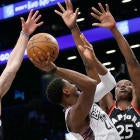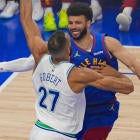As is true of any innovator, there is a method to Nick Nurse's mad science. Down by 23 points heading into the fourth quarter against the Dallas Mavericks, Nurse instructed the Toronto Raptors to run a full-court press. An act of desperation, perhaps, but Nurse remembered their late, press-fueled run two weeks earlier in Philadelphia. The Mavericks were without Luka Doncic. Maybe Toronto could throw them off.
"Coach was just like, 'Just create chaos, create turnovers, create deflections, go down and score,'" Raptors forward Malcolm Miller said. "And be defensive-minded first and then figure out whatever on offense, whatever we can."
Nurse initially just wanted to see what would happen if they ran the press for a few minutes. Toronto made Dallas' ball-handlers uncomfortable, forcing seven turnovers in the fourth quarter, but the most impressive play came when the Mavericks managed to get the ball after halfcourt. It featured Chris Boucher sprinting from the right block and leaping toward the left corner, just barely getting his hand on Seth Curry's 3-point attempt.
You might say it looked like high school basketball, if a high school team were full of high-end NBA athletes. Miller and Boucher shared the court with Rondae Hollis-Jefferson, a shooting-challenged forward with boundless energy; Terence Davis, an undrafted combo guard with length; and Kyle Lowry, a devious All-Star with an all-world basketball brain.
They tried to "be as hectic as possible but move on a string," Miller said, and it worked. They pressed on until they took the lead.
Toronto earned a 110-107 win, becoming the first team in a decade to overcome a 30-point deficit. It was the largest comeback in franchise history. The Raptors' experimental approach, however, was not unusual.
No team switches its defensive coverages more frequently than Toronto. Nurse used a box-and-one and a triangle-and-two in last year's Finals, and while the Raptors had never tried those schemes before, they had spent the regular season cultivating flexibility. As defending champions they have been much more adventurous, mixing in various zones and changing their coverages not just game to game, but minute to minute. If you are not close enough to hear their calls, it can be tough to tell what they're doing.
"We're constantly trying different things," Miller said.
In November, coach-turned analyst Stan Van Gundy broke it down on NBA TV with admiration:
Stan Van Gundy breaks down Nick Nurse's innovative defenses. Raptors, by the way, are the No. 1 team in the league in opponent field goal percentage. pic.twitter.com/ZI6Fd088LE
— William Lou (@william_lou) November 26, 2019
The results have been spectacular: Toronto is second in defensive rating, allowing 103.6 points per 100 possessions, succeeding despite not only the departures of Kawhi Leonard and Danny Green in July but injuries to virtually all of its significant players this season. At 24-12, the Raptors are fourth in the East and will be aiming higher when burgeoning superstar Pascal Siakam, defensive mastermind Marc Gasol and spark plug Norman Powell return.
Nurse said his adjustments are personnel-based. Different opponents demand different styles, and Toronto can play all sorts of different lineups, with different strengths to accentuate and weaknesses to camouflage.
"I just don't think one size fits all," Nurse said.
On offense, Nurse wants his team to play basketball like jazz. He plays piano in his office, and he brought up Thelonious Monk in his first presentation to the team. On the other end, he has "very strong pillars," Gasol said. Regardless of what scheme they are in, Nurse wants the players to be organized.
"Defense isn't nearly as sexy as jazz is, right?" Nurse said. "It's certainly more about are you going to get your ass down and play it? Are you going to be tough? There is certainly some improvising when there's problems, and that's the great teams. And we do that well, too. When we're playing good, we do that well, where somebody goes to help a problem and somebody helps him and the next guy helps him and you can just see it going around. But again, it goes back to my opening statement: most of that's done with energy, toughness and some togetherness."
There is room for creativity, however, from a coach's perspective. The Raptors might come out of a timeout in a new defensive coverage, then return to a more conventional alignment just to keep the other team off-balance.
It might seem audacious or arrogant to try coverages that typically haven't worked in the NBA, but there is humility in Nurse's gambits. In the pace-and-space era, perimeter playmakers have an unprecedented amount of space with which to pick apart traditional defenses. They have become almost impossible to stop.
"The game has changed radically offensively in the last five years, and I just think that maybe it's the defense's turn to radically catch up," Nurse said. "And I think it's spreading really fast, as everything does in this league."
In November, without Lowry and Serge Ibaka, Joel Embiid went scoreless against the Raptors, leaving him to lament that defenders were "everywhere." They also limited LeBron James to 13 points on 5 for 15 shooting, Damian Lillard to nine points on 2 for 12 shooting and Leonard to 12 points on 2 for 12 shooting. In December, James Harden attempted a season-low 11 field goals in Toronto, with Fred VanVleet double-teaming him every time he crossed halfcourt. The idea is to never let stars get comfortable.
"Dudes work on their craft all their life, all summer," Miller said. "It's a matter of making someone do what they do less, what they practice less."
Last week in Miami, the Raptors held Jimmy Butler to eight points on 2 for 10 shooting. The Heat's offense was miserable, but they won anyway, thanks to a 2-3 zone they went to in the first quarter and stayed in for the rest of the game. Toronto shot a horrifying 6 for 42 from 3-point range, out of rhythm and out of sorts.
"My personal opinion: It makes it more interesting for the fans, for the media, even for the players," Brooklyn Nets coach Kenny Atkinson said. "And the success people are having with changing defenses, there's a lot of cases now where teams change defense, it's helped them win the game. So I think you'll just continue to see more of it."
At first, the Raptors weren't sure about all this. Before Nurse was in charge, they were used to sticking with a base defense. Rules generally stayed the same.
"It was frustrating last year 'cause we didn't know the end goal," VanVleet said. "We didn't know if it would work or not, right? So you kind of question it a little bit."
Nurse's coaching staff knew it would take time to get players to buy in. The plan was to install what he calls "foundational principles," and expand the repertoire gradually. For "about the first four months," he said, they declined to do anything "very unconventional" even when they thought the situation called for it.
Toronto gave the players leeway to suggest coverages, and after a while they were begging for more structure and direction. The staff made sure that, by the time the playoffs arrived, the Raptors had experience playing man-to-man and zone, big and small, sending help from different places. When Nurse's staff made major adjustments, it wasn't a shock to the system.
"I'm a guy who likes to think the game through and (I'm) a really high-level thinker, basketball-wise," VanVleet said. "We got a few of those guys. So as one of those guys, it's fun to be on that page when things are changing so rapidly. And it challenges the other guys to raise their level of IQ and I think it benefits us later down the road."
Anyone in the locker room will tell you that seeing it pay off in the biggest way imaginable last season was instructive. "When you win a championship, everything you did was the best thing in the world," VanVleet said. Even now, there are times when Toronto changes up its scheme and players start blowing assignments, but VanVleet likes that it makes him and his teammates think quickly.
"Going through what we went through, getting all those coverages in, we had 'em already at the start of this year," Nurse said. "So that kind of jump-started it. And then obviously our injury situation and things probably catapulted us into being a lot riskier and people buying in a little bit, saying, 'What the hell? We might as well, right?'"
MIller laughed at the notion that the Raptors could play this way without so many smart defenders. "No, definitely not," the forward said. With his particular brand of zen wisdom, Gasol said that there is "no such thing as perfect defense." You are always giving something up, and no scheme is a substitute for the stuff old-school coaches have been preaching forever.
"The speed, the awareness and the physicality you gotta have, it's gotta be from five guys at a very high level,' Gasol said. "There's not one defense that works without it."
Effort, trust and intensity can cover a multitude of sins, but In a league where defenses often look helpless, they are not always enough. Toronto is trying something different because it wants every edge it can get. In the process, it is offering a glimpse of the future, in which coaches will weaponize unpredictability on both ends.
"It's challenging," Gasol said. "It's fun. It's fresh."






















